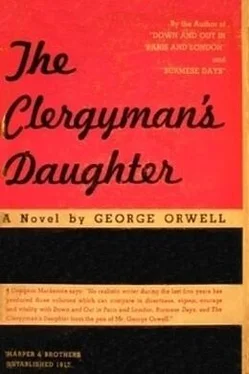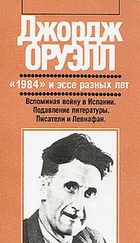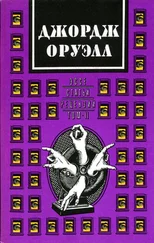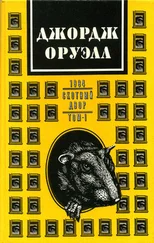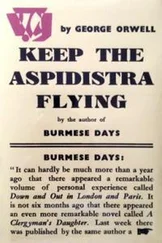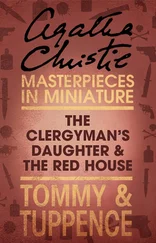'I shall buy five hundred United Celanese,' said the Rector finally.
Dorothy began to give up hope. Her father was now thinking of his 'investments' (she new nothing whatever about these 'investments', except that they went wrong with phenomenal regularity), and in another moment the question of the shop–debts would have slipped entirely out of his mind. She made a final effort.
'Father, let's get this settled, please. Do you think you'll be able to let me have some extra money fairly soon? Not this moment, perhaps—but in the next month or two?'
'No, my dear, I don't. About Christmas time, possibly—it's very unlikely even then. But for the present, certainly not. I haven't a halfpenny I can spare.'
'But, Father, it's so horrible to feel we can't pay our debts! It disgraces us so! Last time Mr Welwyn–Foster was here' (Mr Welwyn– Foster was the Rural Dean) 'Mrs Welwyn–Foster was going all round the town asking everyone the most personal questions about us— asking how we spent our time, and how much money we had, and how many tons of coal we used in a year, and everything. She's always trying to pry into our affairs. Suppose she found out that we were badly in debt!'
'Surely it is our own business? I fail entirely to see what it has to do with Mrs Welwyn–Foster or anyone else.'
'But she'd repeat it all over the place—and she'd exaggerate it too! You know what Mrs Welwyn–Foster is. In every parish she goes to she tries to find out something disgraceful about the clergyman, and then she repeats every word of it to the Bishop. I don't want to be uncharitable about her, but really she—'
Realizing that she DID want to be uncharitable, Dorothy was silent.
'She is a detestable woman,' said the Rector evenly. 'What of it? Who ever heard of a Rural Dean's wife who wasn't detestable?'
'But, Father, I don't seem to be able to get you to see how serious things are! We've simply nothing to live on for the next month. I don't even know where the meat's coming from for today's dinner.'
'Luncheon, Dorothy, luncheon!' said the Rector with a touch of irritation. 'I do wish you would drop that abominable lower–class habit of calling the midday meal DINNER!'
'For luncheon, then. Where are we to get the meat from? I daren't ask Cargill for another joint.'
'Go to the other butcher—what's his name? Salter—and take no notice of Cargill. He knows he'll be paid sooner or later. Good gracious, I don't know what all this fuss is about! Doesn't everyone owe money to his tradesmen? I distinctly remember'—the Rector straightened his shoulders a little, and, putting his pipe back into his mouth, looked into the distance; his voice became reminiscent and perceptibly more agreeable—'I distinctly remember that when I was up at Oxford, my father had still not paid some of his own Oxford bills of thirty years earlier. Tom' (Tom was the Rector's cousin, the Baronet) 'owed seven thousand before he came into his money. He told me so himself.'
At that, Dorothy's last hope vanished. When her father began to talk about his cousin Tom, and about things that had happened 'when I was up at Oxford', there was nothing more to be done with him. It meant that he had slipped into an imaginary golden past in which such vulgar things as butchers' bills simply did not exist. There were long periods together when he seemed actually to forget that he was only a poverty–stricken country Rector—that he was not a young man of family with estates and reversions at his back. The aristocratic, the expensive attitude was the one that in all circumstances came the most naturally to him. And of course while he lived, not uncomfortably, in the world of his imagination, it was Dorothy who had to fight the tradesmen and make a leg of mutton last from Sunday to Wednesday. But she knew the complete uselessness of arguing with him any longer. It would only end in making him angry. She got up from the table and began to pile the breakfast things on to the tray.
'You're absolutely certain you can't let me have any money, Father?' she said for the last time, at the door; with the tray in her arms.
The Rector, gazing into the middle distance, amid comfortable wreaths of smoke, did not hear her. He was thinking, perhaps, of his golden Oxford days. Dorothy went out of the room distressed almost to the point of tears. The miserable question of the debts was once more shelved, as it had been shelved a thousand times before, with no prospect of final solution.
On her elderly bicycle with the basketwork carrier on the handle– bars, Dorothy free–wheeled down the hill, doing mental arithmetic with three pounds nineteen and fourpence—her entire stock of money until next quarter–day.
She had been through the list of things that were needed in the kitchen. But indeed, was there anything that was NOT needed in the kitchen? Tea, coffee, soap, matches, candles, sugar, lentils, firewood, soda, lamp oil, boot polish, margarine, baking powder— there seemed to be practically nothing that they were not running short of. And at every moment some fresh item that she had forgotten popped up and dismayed her. The laundry bill, for example, and the fact that the coal was running short, and the question of the fish for Friday. The Rector was 'difficult' about fish. Roughly speaking, he would only eat the more expensive kinds; cod, whiting, sprats, skate, herrings, and kippers he refused.
Meanwhile, she had got to settle about the meat for today's dinner— luncheon. (Dorothy was careful to obey her father and call it LUNCHEON, when she remembered it. On the other hand, you could not in honesty call the evening meal anything but 'supper'; so there was no such meal as 'dinner' at the Rectory.) Better make an omelette for luncheon today, Dorothy decided. She dared not go to Cargill again. Though, of course, if they had an omelette for luncheon and then scrambled eggs for supper, her father would probably be sarcastic about it. Last time they had eggs twice in one day, he had inquired coldly, 'Have you started a chicken farm, Dorothy?' And perhaps tomorrow she would get two pounds of sausages at the International, and that staved off the meat– question for one day more.
Thirty–nine further days, with only three pounds nineteen and fourpence to provide for them, loomed up in Dorothy's imagination, sending through her a wave of self–pity which she checked almost instantly. Now then, Dorothy! No snivelling, please! It all comes right somehow if you trust in God. Matthew vi, 25. The Lord will provide. Will He? Dorothy removed her right hand from the handle–bars and felt for the glass–headed pin, but the blasphemous thought faded. At this moment she became aware of the gloomy red face of Proggett, who was hailing her respectfully but urgently from the side of the road.
Dorothy stopped and got off her bicycle.
'Beg pardon, Miss,' said Proggett. 'I been wanting to speak to you, Miss—PARTIC'LAR.'
Dorothy sighed inwardly. When Proggett wanted to speak to you PARTIC'LAR, you could be perfectly certain what was coming; it was some piece of alarming news about the condition of the church. Proggett was a pessimistic, conscientious man, and very loyal churchman, after his fashion. Too dim of intellect to have any definite religious beliefs, he showed his piety by an intense solicitude about the state of the church buildings. He had decided long ago that the Church of Christ meant the actual walls, roof, and tower of St Athelstan's, Knype Hill, and he would poke round the church at all hours of the day, gloomily noting a cracked stone here, a worm–eaten beam there—and afterwards, of course, coming to harass Dorothy with demands for repairs which would cost impossible sums of money.
'What is it, Proggett?' said Dorothy.
'Well, Miss, it's they —'—here a peculiar, imperfect sound, not a word exactly, but the ghost of a word, all but formed itself on Proggett's lips. It seemed to begin with a B. Proggett was one of those men who are for ever on the verge of swearing, but who always recapture the oath as it is escaping between their teeth. 'It's they BELLS, Miss,' he said, getting rid of the B sound with an effort. 'They bells up in the church tower. They're a–splintering through that there belfry floor in a way as it makes you fair shudder to look at 'em. We'll have 'em down atop of us before we know where we are. I was up the belfry 'smorning, and I tell you I come down faster'n I went up, when I saw how that there floor's a– busting underneath 'em.'
Читать дальше
